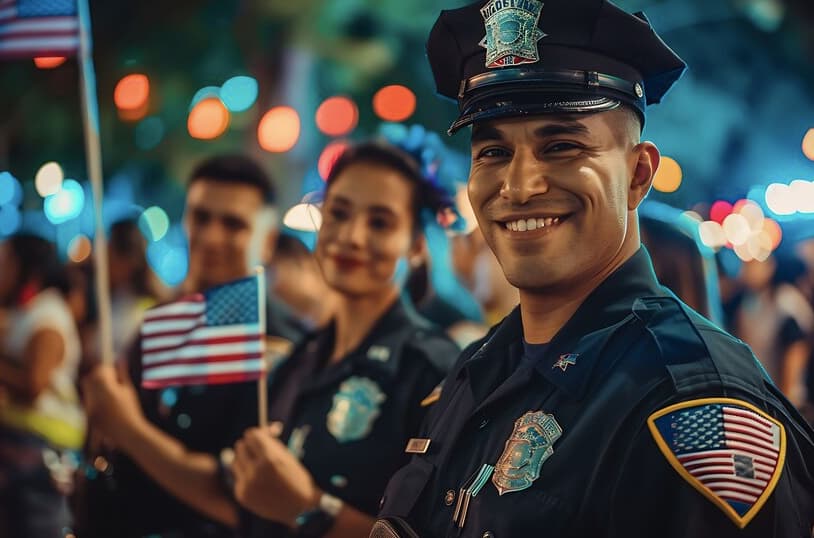The certificate ceremony officers class lynnfield police academy represents a transformative milestone in the journey of law enforcement professionals. This prestigious ceremony marks the culmination of an intensive training period that transforms dedicated civilians into skilled law enforcement officers. It’s not merely a graduation ceremony – it’s a celebration of perseverance, dedication, and the unwavering commitment to public service.
For the graduates, this ceremony symbolizes months of rigorous physical training, countless hours of academic study, and numerous practical exercises that have tested their resolve. Each officer standing proud on ceremony day has overcome personal challenges, pushed through physical limitations, and demonstrated the mental fortitude required for a career in law enforcement.
The significance of this day extends far beyond the academy walls. Family members who have provided unwavering support throughout the training journey witness their loved ones achieve a remarkable goal. Community leaders gather to welcome their newest protectors, and veteran officers stand ready to embrace their future colleagues.
Certificate Ceremony Officers Class Lynnfield Police Academy

The Lynnfield Police Academy has maintained its reputation for excellence by consistently producing officers who exemplify the highest standards of law enforcement.
These graduates aren’t just trained in tactical skills – they’re prepared to be community leaders, problem solvers, and guardians of public safety.
The Lynnfield Police Academy: A Place of Excellence
The Lynnfield Police Academy stands as a beacon of excellence in law enforcement training. Its comprehensive approach to officer development has earned it recognition as one of the most respected police academies in the region.
Foundational Principles
The academy builds its training program on four essential pillars:
- Professional Excellence
- Ethical decision-making
- Professional conduct standards
- Departmental procedures
- Administrative responsibilities
- Report writing and documentation
- Court testimony preparation
- Physical Readiness
- Cardiovascular conditioning
- Strength training
- Defensive tactics
- Pursuit techniques
- Officer safety protocols
- Physical fitness assessments
- Technical Proficiency
- Firearms training
- Emergency vehicle operations
- Crime scene management
- Evidence handling
- Technology systems
- Communication equipment
- Community Engagement
- Cultural awareness
- De-escalation techniques
- Crisis intervention
- Community policing strategies
- Public relations
- Mental health awareness
Comprehensive Training Structure
The academy’s training program follows a carefully designed progression:
| Training Phase | Duration | Core Focus Areas | Key Assessments |
| Orientation | 2 weeks | Academy protocols, Basic fitness | Initial fitness test, Written evaluation |
| Foundation | 4 weeks | Law basics, Physical conditioning | Legal knowledge test, Physical assessment |
| Development | 6 weeks | Tactical skills, Investigation | Firearms qualification, Scenario testing |
| Advanced | 4 weeks | Specialized training, Leadership | Leadership evaluation, Crisis response |
| Integration | 2 weeks | Field experience, Final preparation | Final examinations, Practical scenarios |
| Certification | 2 weeks | Review, Ceremony preparation | Comprehensive assessment, Graduation requirements |
Daily Academic Schedule
The rigorous daily schedule prepares officers for the demands of law enforcement:
- Early Morning Session (5:00 AM – 8:00 AM)
- Physical training
- Defensive tactics
- Equipment maintenance
- Uniform inspection
- Morning Academic Block (8:30 AM – 12:00 PM)
- Constitutional law
- Criminal procedures
- Traffic regulations
- Department policies
- Investigation techniques
- Report writing
- Afternoon Practical Training (1:00 PM – 4:30 PM)
- Firearms training
- Emergency vehicle operations
- Crime scene processing
- Active shooter response
- Building searches
- Traffic stop procedures
- Evening Study Period (5:00 PM – 7:00 PM)
- Assignment completion
- Peer study groups
- Physical conditioning
- Equipment maintenance
The Importance of the Certificate Ceremony
The certificate ceremony represents the official transition from trainee to law enforcement officer. This ceremonial milestone carries deep significance for all participants.
Ceremonial Elements
The ceremony incorporates various traditional and meaningful elements:
- Official Proceedings
- Processional march
- Presentation of colors
- National anthem
- Invocation
- Welcome addresses
- Guest speakers
- Award presentations
- Badge pinning
- Oath of office
- Recessional
- Recognition Components
- Academic excellence awards
- Physical fitness achievements
- Leadership recognition
- Perfect attendance honors
- Most improved officer
- Community service recognition
- Instructor appreciation
- Special unit citations
Ceremonial Significance Table
| Element | Symbolic Meaning | Traditional Importance |
| Badge Pinning | Authority transfer | Family connection |
| Oath of Office | Public commitment | Legal requirement |
| Final Inspection | Professional readiness | Attention to detail |
| Class Photo | Unity and achievement | Historical record |
| Award Presentation | Excellence recognition | Motivation for others |
| Command Transfer | Chain of command | Organizational structure |
A Day of Pride and Accomplishment
The certificate ceremony day unfolds as a carefully orchestrated celebration of achievement and new beginnings.
Morning Preparation
- Personal Readiness (4:00 AM – 6:00 AM)
- Uniform preparation
- Equipment check
- Personal grooming
- Mental preparation
- Group Activities (6:00 AM – 8:00 AM)
- Final formation practice
- Uniform inspection
- Group photographs
- Last-minute adjustments
Ceremony Program
The formal ceremony typically follows this structure:
- Opening Segment (9:00 AM – 10:00 AM)
- Processional
- Color guard presentation
- National anthem
- Opening remarks
- Department acknowledgments
- Main Ceremony (10:00 AM – 12:00 PM)
- Keynote address
- Class speaker presentation
- Award ceremonies
- Badge pinning
- Oath of office
- Conclusion (12:00 PM – 1:00 PM)
- Final remarks
- Class photo
- Recessional
- Family greetings
The Role of Family and Community Support
Success in law enforcement training requires a strong support network of family, friends, and community members.
Family Support Network
Families provide essential support throughout the training:
- Emotional Support
- Understanding stress
- Providing encouragement
- Maintaining stability
- Celebrating progress
- Managing expectations
- Offering perspective
- Practical Assistance
- Schedule accommodation
- Financial support
- Domestic responsibilities
- Study environment
- Stress management
- Time management
Community Engagement Initiatives
The academy actively involves the community:
- Public Partnership Programs
- Citizen advisory boards
- Community feedback sessions
- Cultural diversity training
- Public safety workshops
- Youth engagement programs
- Business partnership initiatives
Looking Ahead: The Future of the Graduates
Post-graduation career development offers numerous opportunities for advancement and specialization.
Career Advancement Paths
Officers can pursue various career tracks:
- Patrol Division
- Community policing
- Traffic enforcement
- Crime prevention
- Emergency response
- Public safety
- Neighborhood liaison
- Investigation Units
- Detective bureau
- Special victims unit
- Narcotics division
- White-collar crime
- Cybercrime unit
- Cold case team
- Specialized Operations
- SWAT team
- K-9 unit
- Motorcycle patrol
- Marine unit
- Aviation division
- Tactical response
Professional Development Requirements
Ongoing training ensures officers maintain high standards:
- Annual Requirements
- Firearms qualification
- Physical fitness testing
- Legal updates training
- Emergency response certification
- First aid/CPR renewal
- Use of force review
- Career Enhancement
- Leadership development
- Advanced tactical training
- Specialized unit qualification
- Instructor certification
- Advanced technology training
- Crisis intervention specialization
Frequently Asked Questions
Q: What makes the Lynnfield Police Academy unique?
A: The academy distinguishes itself through:
- Comprehensive training approach
- Experienced instructor staff
- Modern facilities and equipment
- Strong community partnerships
- High graduation success rate
- Excellent placement record
Q: How demanding is the physical training program?
A: Physical training includes:
- Daily fitness routines
- Progressive difficulty levels
- Regular assessments
- Individual coaching
- Injury prevention
- Recovery protocols
Q: What support services are available to trainees?
A: The academy provides:
- Academic counseling
- Physical training guidance
- Mental health support
- Financial advisement
- Career planning
- Family support resources
Q: How does the academy prepare officers for community policing?
A: Community policing preparation includes:
- Cultural diversity training
- Communication skills development
- Conflict resolution techniques
- Community engagement practices
- Problem-solving strategies
- Public relations training
Q: What are the post-graduation requirements?
A: After graduation, officers must:
- Complete field training
- Maintain certifications
- Attend regular updates
- Pass physical assessments
- Complete continuing education
- Participate in specialized training
Q: How does the academy address current law enforcement challenges?
A: The academy stays current through:
- Regular curriculum updates
- Technology integration
- Contemporary case studies
- Scenario-based training
- Expert guest speakers
- Current events discussion
Also Check:
- GoCryptoBet.com Bet
- 402020 2150 mAh Battery
- 5 Important Questions to Ask a Car Hire Company
- 5 Things to Consider Before Ordering Flowers for Delivery
Conclusion:
The certificate ceremony officers class at the Lynnfield Police Academy marks both an ending and a beginning.
It concludes an intensive period of training while launching careers dedicated to public service and community protection.
These graduates have demonstrated exceptional commitment, perseverance, and dedication throughout their training.
They leave the academy equipped with the knowledge, skills, and ethical foundation necessary for success in modern law enforcement.
As these new officers step forward to serve their communities, they carry with them not just their certificates and badges, but the pride, responsibility, and dedication that defines excellence in law enforcement.
Their journey from civilian to police officer stands as a testament to personal achievement and professional commitment.
This comprehensive guide to the Lynnfield Police Academy certificate ceremony reflects the dedication, professionalism, and excellence that characterize modern law enforcement training.
The ceremony stands as a proud tradition that honors achievement while embracing the future of public safety and community service.



